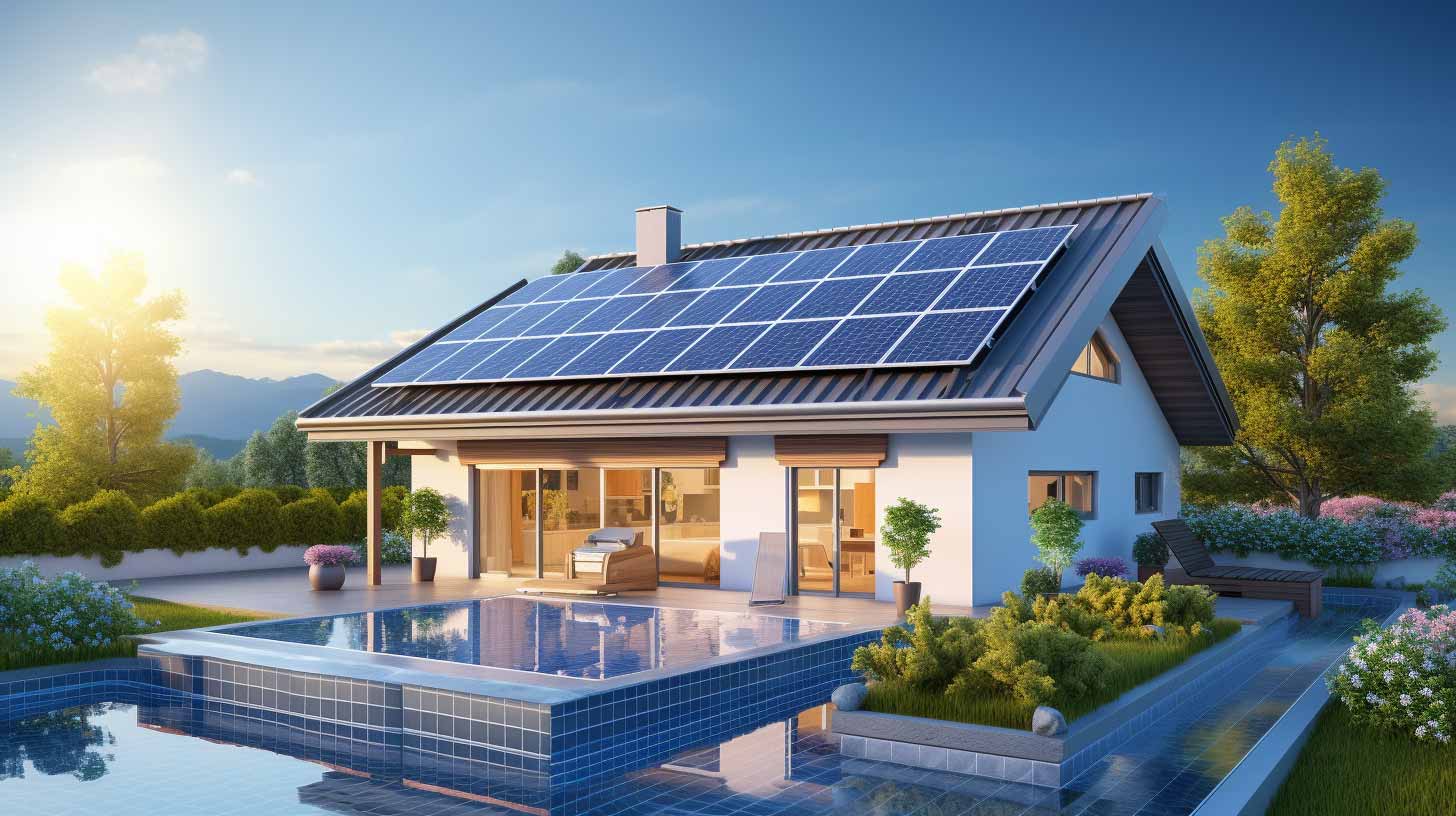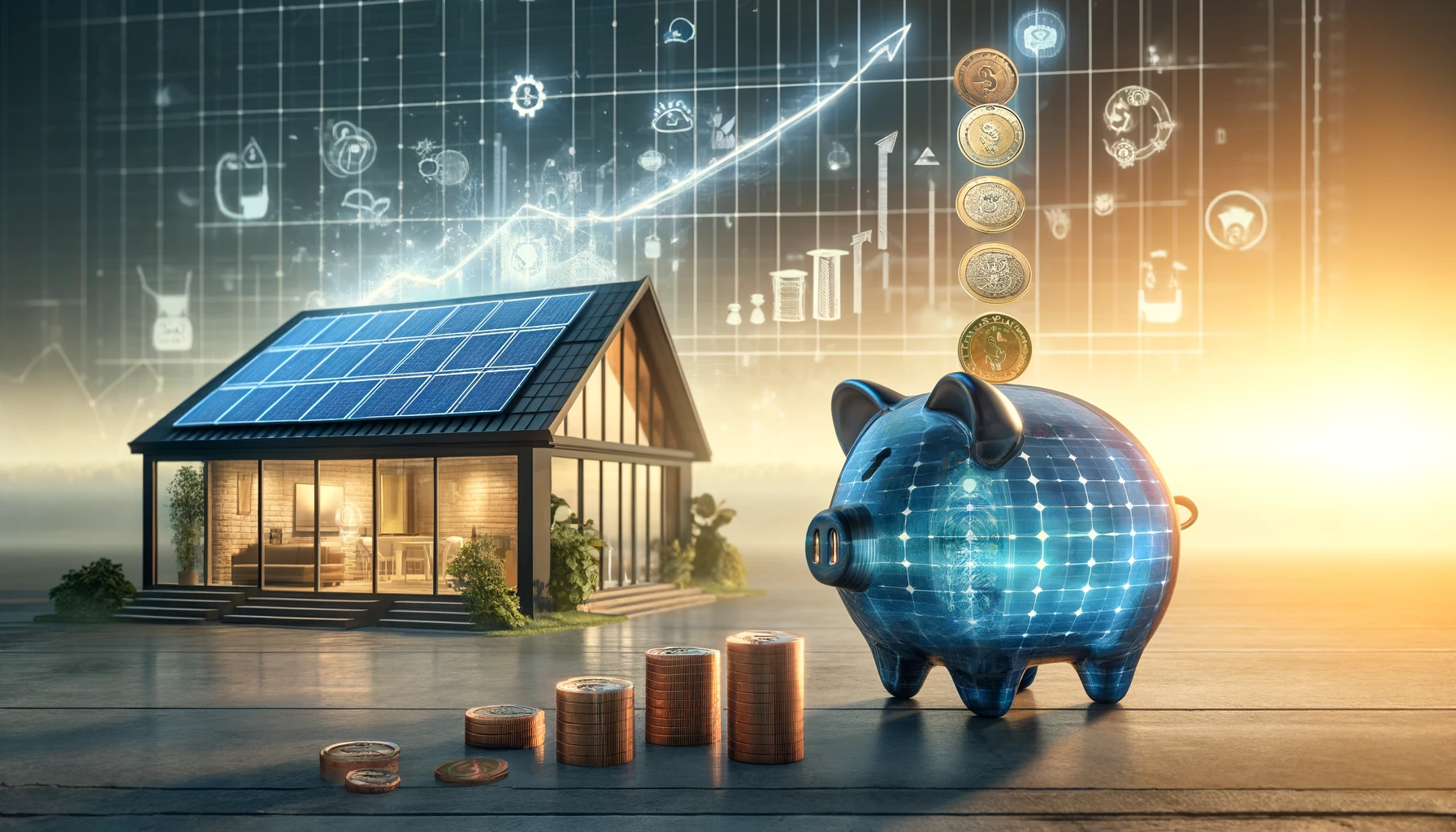Are you looking for a clean, cost-effective, and reliable energy source for your home? Look no further than home solar systems. These systems harness the sun’s power and convert it into electricity, providing power for your household. The best part? They are environmentally friendly, emitting no smoke, gases, or chemicals. By investing in a home solar system, you can achieve energy independence and reduce your dependence on external sources. Say goodbye to rising energy prices and hello to long-term savings on your electricity bills. These systems also offer a secure and stable flow of electricity, unaffected by power outages or grid failures. And let’s not forget about the positive impact on the environment. By choosing solar energy, you are actively contributing to reducing carbon emissions and air pollution. So, why wait? Join the growing number of homeowners embracing the benefits of home solar systems.
Key Takeaways
- Home solar systems provide clean and environmentally friendly energy generation, reducing carbon emissions and air pollution.
- They offer long-term savings on electricity bills and have a lifespan of 25-30 years, resulting in significant cost savings over time.
- Solar power systems provide energy independence, allowing households to generate their own electricity and reducing dependence on external energy sources.
- They offer a secure and stable flow of electricity, unaffected by power outages or grid failures, and can be combined with battery storage for backup power.
What is a residential solar system?
So, what’s a residential solar system? It’s a system that harnesses solar energy from the sun and converts it into electrical energy to power your home and appliances. There are many advantages to having a home solar system. First, it’s a clean energy source that doesn’t emit smoke, gases, or chemicals, which is great for the environment. Second, it’s cost-effective in the long run because you only need to make a one-time investment, and the maintenance costs are minimal. However, there are also some drawbacks. One drawback is that solar panels don’t have the capability to store energy, so they can’t provide electricity at night or during storms. Another drawback is that home solar systems can impact the electricity grid and infrastructure, as they provide a decentralised power supply and reduce dependence on state energy sources. Overall, having a home solar system can be a great way to generate your own clean and cost-effective electricity. Still, it’s important to consider the limitations and potential impact on the grid.
Environmentally Friendly Energy
Reduce your carbon footprint and support sustainable development goals by harnessing solar energy with an environmentally friendly home solar system. By choosing solar power, you not only contribute to a cleaner environment but also enjoy numerous health benefits. Unlike traditional energy sources, solar systems generate electricity without emitting harmful smoke, gases, or chemicals. This means cleaner air for you and your family to breathe. Additionally, solar power systems help combat climate change and reduce the overall carbon footprint, leading to a healthier planet for future generations.
Moreover, investing in solar energy stimulates economic growth. The growth of the solar industry creates job opportunities in manufacturing, construction, installation, and maintenance. By going solar, you can play a part in creating a sustainable future while supporting local communities and enjoying the economic benefits of renewable energy.
Decentralised Power Supply
Take control of electricity generation and consumption with a decentralised power supply through solar power systems. By utilising solar energy, you can enjoy the advantages of a decentralised power supply in your home. One of the major benefits is the reduction of dependence on state energy sources, which leads to a more transparent and predictable cost structure. You no longer have to worry about inflated unit charges and fluctuating rates caused by raw material transportation. Additionally, decentralised power supply through solar systems has a positive impact on the energy market by providing a stable and reliable flow of electricity. It also reduces the strain on the grid during peak demand periods. With solar power, you can have peace of mind knowing that you are contributing to a more sustainable and efficient energy future.
Energy Independence
Achieve energy independence by harnessing the power of solar energy for your home. By installing a home solar system, you can break free from the reliance on external energy sources and take control of your own electricity generation. Not only does this provide a reliable and stable energy supply, but it also protects you from rising energy prices. Plus, there are additional benefits to consider. Home solar systems promote energy efficiency, allowing you to reduce your carbon footprint and contribute to a cleaner environment.
Additionally, by going solar, you can take advantage of government incentives and rebates, further reducing the cost of your investment. So why wait? Embrace energy independence and enjoy clean, cost-effective, and reliable solar energy power for your home.
Long-Term Savings
Maximise your financial savings with a home solar system that offers long-term returns on your investment. By harnessing the sun’s power, you can significantly reduce your electricity bills and enjoy the benefits of energy efficiency incentives. Home solar systems have a lifespan of 25-30 years, ensuring that you save thousands of dollars over their lifetime. With minimal maintenance costs, the financial benefits are undeniable.
In addition to saving money, installing a home solar system allows you to take advantage of various financial incentives. Many governments offer tax credits and rebates for installing solar panels, further enhancing your long-term savings. Additionally, some utility companies offer net metering programs, allowing you to sell excess electricity back to the grid and earn credits on your energy bill.
Investing in a home solar system not only provides a clean and renewable energy source but also offers substantial financial benefits. Take control of your energy costs and enjoy the long-term savings of a home solar system.
Energy Security
Ensure your energy supply remains secure and stable by installing a home solar system. Grid resilience is a crucial aspect of energy security, and a solar power system provides a reliable solution. With a home solar system, you won’t have to worry about power outages or grid failures. Even during emergencies, you will have access to a continuous flow of electricity. Additionally, you can enhance your energy security by combining your solar system with solar battery storage for backup power. This means that even if the sun isn’t shining, you will still have a reliable source of electricity. By investing in a home solar system, you can enjoy peace of mind knowing that your energy supply is protected and that you have a backup power source when you need it.
Job Creation
Now that you understand the importance of energy security provided by home solar systems, let’s delve into another significant benefit: job creation. By embracing solar technology, you not only contribute to a cleaner and more sustainable future but also support economic growth. The solar industry offers many job opportunities, from manufacturing and construction to installation and maintenance. The number of jobs in the renewable energy sector will increase significantly in the coming years. Additionally, solar energy investment stimulates local employment and creates a positive ripple effect on the economy. Moreover, governments often provide incentives and rebates for solar system installations, encouraging job growth and economic development in the renewable energy sector. So, by choosing solar power, you not only save on electricity bills but also play a part in building a stronger economy.
Positive Environmental Impact
By choosing solar power, you can actively contribute to a cleaner environment and combat climate change. Home solar systems have a positive environmental impact by reducing carbon emissions and air pollution. They help to preserve natural resources and contribute to sustainable development goals. Solar energy is a renewable and clean energy source that reduces our dependence on fossil fuels. By harnessing the power of the sun, you can significantly reduce your carbon footprint and minimise your impact on the environment. Solar power systems are an eco-friendly choice that supports a greener future. So, why not switch to solar and participate in the solution? By investing in solar energy, you are taking a bold step towards a cleaner and more sustainable world.
Off-grid Power Generation
Consider going off-grid with a home solar power system, allowing you to become self-reliant and independent from the state grid. Off-grid power generation is especially advantageous in remote areas where reliable power infrastructure may be lacking. By installing off-grid solar systems, you can enjoy efficient power generation without needing a grid connection. This not only promotes sustainable living but also helps you save on electricity costs. Off-grid solar systems provide a reliable and stable electricity supply, ensuring that you have access to power even during emergencies. They are popular for urban self-reliance and cost savings. With the increasing advancements in solar technology, off-grid power generation has become a viable option for those seeking energy independence and a cleaner environment.
Job Creation by Solar Technology
Explore the job opportunities solar technology creates, as it contributes to economic growth and stimulates local employment. The solar industry is experiencing significant growth, increasing job opportunities. From manufacturing and construction to installation and operations, solar technology creates a wide range of jobs. In fact, it is projected that the number of electricity-related jobs will increase from 21 million in 2015 to 35 million by 2050. Furthermore, renewable energy technologies, including solar power systems, can potentially create hundreds of thousands of jobs. This growth is especially significant in regions transitioning from coal to clean energy, where the solar industry creates more jobs than the coal sector. By investing in solar energy, not only can individuals benefit from clean and cost-effective electricity, but they can also contribute to the economic development of their communities.
Frequently Asked Questions
How much does a home solar system cost to install?
The cost of installing a home solar system depends on various factors, such as the size of the system, location, and specific requirements. A typical residential solar system can range from $10,000 to $30,000. It’s important to consider the cost breakdown, including the price of solar panels, installation, and additional equipment or permits. Financing options, such as solar loans or leasing, are available to make the upfront cost more manageable. The most important thing to consider though is not cost, but the return on investment (ROI).
How long does it take to recoup the initial investment in a home solar system through energy savings?
Calculating ROI: How quickly can you recover your investment in a home solar system? The time it takes to recoup your initial investment in a home solar system through energy savings depends on various factors, such as the size of the system, your electricity usage, and the cost of electricity in your area. On average, homeowners can expect to recoup their investment within 5 to 10 years, although we’ve seen customers recoup their costs in even shorter timeframes. To make home solar systems more affordable, you can explore different options for solar panel financing, such as loans, leases, or power purchase agreements.
Can a home solar system power an entire household?
Yes, a home solar system can power an entire household. By harnessing solar energy from the sun, these systems provide clean, cost-effective, and reliable electricity for all your household needs. Solar panels convert sunlight into electrical energy, which can be used to power appliances, lighting, heating, and cooling systems. With the ability to generate your own electricity, you can reduce your reliance on traditional energy sources and enjoy the benefits of clean, cost-effective, and reliable power for your entire household.
Are government incentives or rebates available for installing a home solar system?
Yes, there are government incentives and rebates available for installing a home solar system. These incentives provide financial benefits to help offset the initial cost of installation. The government recognises the importance of renewable energy and offers programs to encourage its adoption. By taking advantage of these incentives, you can not only reduce your carbon footprint but also save money on your electricity bills in the long run. It’s a win-win situation for both the environment and your wallet.
What maintenance is required for a home solar system?
Regular solar system maintenance is crucial to ensure optimal performance. Common issues with home solar systems include dust accumulation on panels, loose connections, and inverter malfunctions. To address these, you should clean the panels periodically, tighten any loose connections, and monitor the inverter for any issues. Additionally, it’s recommended to inspect the system’s wiring and components for any signs of damage. By taking these maintenance steps, you can ensure that your home solar system continues to provide clean, cost-effective, and reliable energy.







